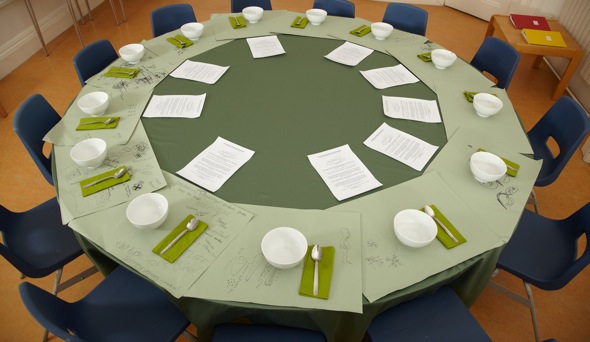Sunday, 28 February 2010
Celery, Apple and 'Anster' cheese Soup
Saturday, 27 February 2010
Oatmeal soup and conversation with Mike Small
Sunday, 21 February 2010
Oatmeal soup recipe
1 piece turnip.
¾ pint milk.
1 carrot.
1 leek..
1 oz. oatmeal.
1 pint white stock.
Seasoning.
Chopped parsley.
Add the stock. Simmer for an hour. Add parsley and seasoning.
The trick is to finely chop or dice the vegetables...
Sunday, 7 February 2010
SIMMERED VENISON WITH WALNUTS AND POMEGRANATE
A NICHOLA FLETCHER VENISON RECIPE
SIMMERED VENISON WITH WALNUTS AND POMEGRANATE
The concentrated pomegranate flavour adds exactly the right balance of sweet and tart so typical of Persian cooking. If you can’t get hold of pomegranate juice, use really tart fruit jelly. Walnuts were so highly regarded that they were reserved for the kings of Persia; once they were taken to Greece, they became the food of the gods, so voluptuous is their oil. When minced and slowly simmered, they make a fabulous accompaniment to venison; it’s deliciously rich and festive.
Serves 6
900g (2 lb) diced venison haunch or shoulder
600ml (1 pt) venison or other stock
1 onion
150g (5 oz) freshly shelled walnuts
1 litre pomegranate juice (or 2-3 tablespoons tart jelly)
Juice of 1 lemon (optional)
Method:
If using pomegranate juice, put it in a wide pan and boil it down until only 3 or 4 tablespoons of syrup remain. It will be reduced by the time the meat has cooked. Chop the walnuts into small crumbs. Fry them gently in a teaspoon of oil, stirring for about fifteen minutes until they darken, then draw them off the heat.
Fry the onion in oil till golden brown, then add the meat and brown that too. Add just enough stock to cover the meat, cover, and simmer gently for 30 minutes. Then add the fried walnuts and simmer for another 30 minutes, topping up with stock if necessary.
Then stir in the pomegranate paste (or jelly) and continue to simmer until the meat is tender (about another 30-45 minutes, longer for shoulder). Season with salt and pepper, adding lemon juice if necessary to increase the note of tartness. Serve with steamed spinach and plain or saffron rice. For festive sparkle, strew some jewel-like pomegranate seeds over the rice.
© Nichola Fletcher
From Nichola Fletcher’s Ultimate Venison Cookery £20.00. Signed copies available from www.seriouslygoodvenison.co.uk
Duck soup and conversation with the Fletchers - 31st January

Sunday, 31 January 2010
Wednesday, 13 January 2010
Details of the Events
Jan 31st
The discussion will be initiated by Nicola and John Fletcher and we will be serving duck soup with false moustaches.
Nichola Fletcher is a food writer, food historian and food producer. (She is also a designer and goldsmith but that is another story). One of her specialist interests is meat, particularly game meats. The topics she finds interesting are the cultural aspects of meat-eating, both in the past and now, as well as peoples' perceptions (often erroneous) of what meat-eating involves and the corollary to that: what not eating meat involves. Power, religion, heresy, feasting, joy, denial, survival, climate - all these and more are involved.
John Fletcher is a qualified vet who did a PhD from
http://seriouslygoodvenison.co.uk/
Feb 7th
The discussion will be initiated by Eva Schonveld and we will be serving a roasted garlic and potato soup
Eva Schonveld runs Transition Scotland Support, which aims to support people who want to use the Transition model to re-localise their communities. This means communities taking back responsibility for feeding themselves and producing their own energy as well as many of the other things we need to sustain ourselves and thrive. This can lead to more local employment, better health, and more fulfilling social relations, as well as being a way to tackle the problems of climate change and the ever rising price of oil.
Eva co-organised the first National Local Food Gathering in
Feb 21st
The discussion will be initiated by Mike Small and we will be serving an oatmeal soup.
Mike runs the Fife Diet Project, a mass-member food network of people accessing sustainable local food. The project brings people together who want to know where their food comes from and how it was produced, believing that together we can create alternatives to the globalised food system that will be part of our low carbon future. The project aims to help each other re-learn how to eat seasonally and challenge the insanity of food miles. Mike will be talking about recovering our national and local food culture as an antidote to globalisation.
Feb 28th
Jane is a local producer and produces ‘Anster’ cheese. The cheese is hand-made on the farm – to a traditional recipe – by Jane, using unpasteurised milk from her husband Robert’s herd of home-bred Holstein Friesian cows. The Stewart family are the only farmers in Fife making cheese, and are now in their third year of production. They also have a coffee shop on the farm, and are a 4 star Visitor Attraction with Visit Scotland - so people can come along to see the cheese being made, and then enjoy luch or coffee and home-baking in this unique venue.
Jane will talk about how she learned to make cheese, and how this new venture complements their existing farming business. She will also talk about challenges she has faced along the way so far, and what plans are for the future. Jane hopes that people will ask questions, and she will be interested to listen to opinions, and talk about local food in general, and its availability in Fife in particular.





